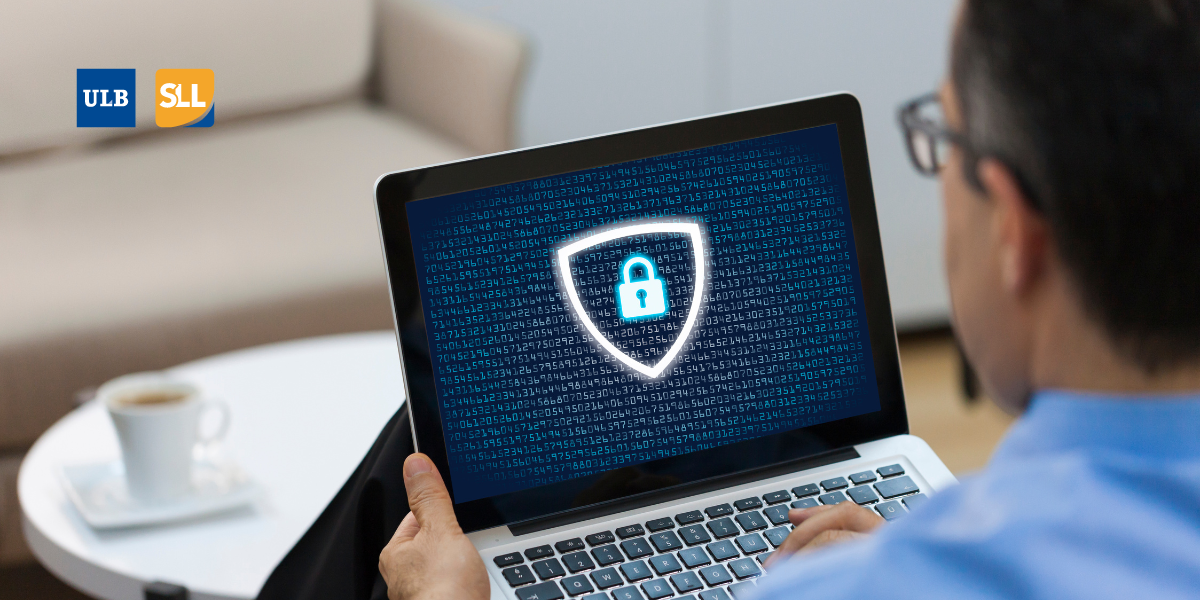Apprenez-en davantage sur Solvay Lifelong Learning.
Executive Master in
Cybersecurity Management
🔔 Il ne reste que quelques places pour la rentrée de janvier : inscrivez-vous maintenant !
Vous ne pourrez pas nous rejoindre pour le début du programme le 9 janvier ?
Contactez Alina Kobal, Programme Manager, afin d’explorer les options qui s’offrent à vous.
Location
Duration
Frequency
Language
Tuition
Application deadline
Programme start:
Meilleure école de gestion belge francophone

Pour qui ?
À qui s’adresse cette formation ?
Profil
Ce programme s'adresse aux professionnels ayant besoin de connaissances managériales et pratiques dans les six domaines représentant les piliers des activités de gestion de la cybersécurité.
Prérequis à la formation
- Au moins 5 ans d'expérience en tant que responsable digital ou cybersécurité ;
- Être impliqué activement dans les activités numériques ou de cybersécurité et dans le processus de prise de décision ;
- Être de nationalité d’un État membre de l’Union européenne ou d’un pays européen allié de l’OTAN. Les candidatures provenant d'autres pays pourront être examinées au cas par cas.
Bénéfices
Pourquoi suivre l'Executive Master in Cybersecurity Management ?
Boostez votre carrière en tant que manager en cybersécurité en vous concentrant sur les connaissances et pratiques essentielles du secteur. Cette formation est conçue pour fournir une approche complète et stratégique de la cybersécurité, vous dotant de l'expertise nécessaire pour gérer le paysage en constante évolution des cybermenaces.
Développez une connaissance approfondie des concepts, des pratiques et des stratégies clés en matière de cybersécurité, indispensables pour exercer un leadership efficace dans ce domaine en constante évolution.
En accord avec les normes, les réglementations et les pratiques européennes, l'Executive Master in Cybersecurity Management aborde les domaines de connaissances essentiels et les défis fondamentaux pour protéger les organisations contre les cybermenaces.
Pour mener à bien des prélectures efficaces et des recherches personnelles intensives pendant la partie "ACQUIRE", les participants ont un accès complet aux ressources suivantes pendant toute l'année universitaire :
- Base de données de livres Perlego.
- Normes ISO en mode lecture seule.
- Adhésion à ISACA comprenant tous les livres disponibles, les références, les articles de revues et les corpus de connaissances.
- Plateforme d'apprentissage CANVAS avec l'ensemble des ressources partagées.
Notre formation est accessible à travers l'Europe grâce à un modèle éducatif hybride, spécialement conçu pour les professionnels de la cybersécurité. Associez cette expérience captivante à votre activité professionnelle actuelle.
La formation comprend :
- Des travaux de groupe, de 3 à 5 personnes en moyenne, lors du développement de l'étude de cas d'entreprise pour chaque module.
- Des prélectures et recherches individuelles, en étant accompagné d'un coach.
- Interventions de spécialistes experts et d'invités lors des deux jours de cours sur site par module.
- Présentation de chaque étude de cas fait en groupe devant le jury à la fin de chaque module de cours.
Leadership en matière de sécurité de l'information
Les activités principales de gestion d'un responsable de la sécurité de l'information moderne comprennent le processus de gouvernance de la sécurité, le processus de gestion des risques, le processus de gestion des programmes et le processus de gestion des incidents. Ce module abordera la description de poste d'un CISO typique aujourd'hui et où le CISO s'insère dans l'organisation, y compris les lignes de reporting et les responsabilités, les compétences et l'expertise ; et parlera des défis typiques auxquels les CISO sont confrontés dans leur rôle.
- Responsable du module : Marc Vael, Global Security Leader Planning & Coordination chez Veralto. Voir sa vidéo de présentation.
Contrôles de sécurité
Ce module guidera les participants à travers le processus d'analyse du contexte, de définition de la portée, de modélisation des menaces, de définition des contrôles de sécurité et des exigences, en tenant compte de l'espace de solution pour les contrôles, y compris les technologies et les modèles d'exploitation, puis en évaluant enfin les risques (intrinsèques vs résiduels) et en les ancrant dans la politique, en veillant à ce que les contrôles fonctionnent comme prévu, par exemple, pour des obligations ou certifications internes ou externes d'assurance. Cette partie s'appuie sur les concepts introduits dans le Module 1.
- Responsable du module : Wim Bartsoen, Chief Digital Security Officer chez Securitas Group. Voir sa vidéo de présentation.
Architecture de sécurité
Bien souvent, on parle de "sécurité par conception" ou "confidentialité par conception". En effet, la sécurité ne peut pas être simplement "ajoutée" ultérieurement de manière efficace. Une meilleure sécurité est intégrée "par conception" à tous les niveaux de l'entreprise, de l'architecture d'entreprise et de solution, et plus elle est intégrée à votre conception/livraison ainsi qu'à l'exécution et aux opérations, mieux vous pourrez comprendre votre position en matière de sécurité ainsi que les lacunes et les risques en suspens.
- Responsable du module : Erik R. Van Zuuren, Fondateur de TrustCore.EU. Voir sa vidéo de présentation..
Opérations de sécurité
Ce module approfondira les concepts des modules précédents, où la gouvernance de la sécurité de l'information, la mise en œuvre de contrôles de sécurité et la mise en place d'une architecture sécurisée sont des éléments clés pour mettre en place une équipe d'opérations de sécurité qualitative.
- Responsable du module : Remy Knecht, Chief Security Officer chez ITSME. Voir sa vidéo de présentation.
Terrain d'action en matière de cybersécurité
Les pratiques de gestion de la cybersécurité nécessitent la connaissance de son propre entreprise, de ses vulnérabilités fonctionnelles et techniques, ainsi que du paysage des menaces qui doivent être traitées. Les capacités qui nécessitent la construction d'une cybersécurité comprennent les techniques et processus d'identification, de protection, de détection, de réponse et de récupération.
- Responsable du module : Taco Mulder, Chief Information Security Officer au CHU Brugmann. Voir sa vidéo de présentation.
Management et administration
Tout au long de l'année
Ce module permettra aux participants de découvrir les bases de la gestion générale dédiées aux professionnels de la cybersécurité et du numérique. Il se décompose en quatre parties : Finance, Stratégie, Leadership et Capital Humain. Dans la première partie, les participants comprendront mieux l'art et le langage de la finance. Les sujets qui devront être étudiés sont les défis du compte de résultat, du bilan, de la trésorerie, des ratios financiers, du retour sur investissement et du fonds de roulement.
- Responsable du module : Georges Ataya, Vice-Président de la Belgian Cybersecurity Coalition. Voir sa vidéo de présentation.
Vos intervenants
Des praticiens chevronnés, passionnés par leur métier.
Un modèle d'enseignement hybride et mixte
Chaque module est dispensé sur une période de deux mois, en combinant des études à son propre rythme et des cours en présentiel (2 journées complètes sur le campus tous les 2 mois). La méthode d'apprentissage mixte est appliquée pour chaque module de la manière suivante :
- La partie "Acquire" comprend trois semaines de prélecture en autonomie, tout en étant guidé par un coach, ainsi que 4 à 8 heures d'apprentissage autonome par semaine. Les participants ont accès à des documents de lecture recommandés, aux normes ISO, à PERLEGO et à l'adhésion à ISACA, qui regroupe plusieurs centaines de livres, d'articles et de corpus de connaissances pour compléter la partie "Acquire".
- La partie "Evaluate" comprend un court questionnaire visant à vérifier l'avancement des préparations pour les 2 journées complètes de cours sur place.
- La partie "Build" implique de participer à des cours et des ateliers sur le campus pendant 2 journées complètes. Ces deux journées sont animées par un coach expérimenté et des conférenciers invités qui sont des experts en cybersécurité de premier plan.
- La partie "Practice" consiste à travailler sur une étude de cas en groupe avec les autres participants (de 3 à 5 personnes). Grâce aux connaissances acquises lors de chaque module et phase, les participants créent/développent leurs rapports de gestion pour résoudre les défis de l'étude de cas.
- Partie "Deliver" - pendant cette phase, les participants présentent leur étude de cas en groupe. À la fin de chaque module, les participants répondent à un questionnaire à choix multiples pour évaluer les connaissances acquises lors du module.
Adaptés à vos besoins et à vos objectifs de carrière
- Un outil de développement de carrière est mis à disposition des participants pour identifier leurs compétences fortes et faibles en se basant sur leur auto-évaluation et le rôle qu'ils choisissent. Sur cette base, ils ajustent leur expérience éducative pour se concentrer sur les domaines dont ils ont le plus besoin.
- En se basant sur les résultats de l'auto-évaluation, les participants adaptent leurs efforts pour se concentrer sur les domaines dont ils ont le plus besoin pour le rôle ciblé. Un entretien d'admission personnel est ensuite mené pour formaliser le plan d'études et permettre aux participants de progresser.
- En conséquence, les phases 1 (Acquire) et 4 (Practice) sont toutes deux nécessaires pour aborder ces domaines d'intérêt.
- Un entretien d'admission est réalisé avec chaque candidat afin d'évaluer sa "compatibilité" avec la formation, de définir ses objectifs et ses motivations pour rejoindre le programme et de définir un plan d'études.
- Un autre entretien est réalisé avant l'obtention du certificat afin d'évaluer l'amélioration des compétences identifiées comme faibles par les participants.
"La menace d'une pénurie de compétences technologiques plane sur l'Union européenne. Rien qu'en France, plus de 15 000 postes d'experts en cybersécurité sont ouverts mais non pourvus, selon une étude récente du cabinet de conseil Wavestone.
Ce "problème de ressources humaines" est ce qui va nous limiter dans les années à venir."

Guillaume Poupard
Chef de l'Agence française de cybersécurité (ANSSI) au Forum international de la cybersécurité (8 juin 2022, Lille)
Faites partie d’un réseau exceptionnel de plus de 35 000 alumni pour ne jamais cesser d’apprendre et d’évoluer. Le réseau Solvay Schools Alumni est l’un des plus grands réseaux d’affaires en Belgique, avec des membres présents à travers le monde. Chaque année, près de 50 événements sont organisés, offrant des opportunités de formation continue, de développement de carrière et de networking.

Denisa Kurtagic
Analyste des menaces
Ministère de la défense du Monténégro

Siska Hallemeesch
Consultante en cybersécurité - Manager
NVISO

Michel Daher
Chief Information Security Officer
BBE

Marc Samson
Advisory Board Member
ISACA Belgium

Josephina Haex
ICT Director, FPS Policy & Support
BOSA
La Fondation Women4Cyber Mari Kert - Saint Aubyn est une organisation à but non lucratif qui vise à promouvoir, encourager et soutenir la participation des femmes dans le domaine de la cybersécurité. Solvay Lifelong Learning est honoré d'offrir en collaboration avec Women4Cyber une bourse complète et trois bourses partielles pour l'Executive Master in Cybersecurity Management, et ce à chaque nouvelle rentrée.
Quel est le certificat délivré ?
L'Executive Master in Cybersecurity Management détient des accréditations de la part d'EQUIS, de Qfor et du KMO Portefeuille.
À la fin de la formation, les diplômés recevront le Certificat Universitaire "Executive Master in Cybersecurity Managemen", décerné par l'ULB, reconnaissant ainsi leur réussite.
Comment financer ma formation ?
TARIFS PRÉFÉRENTIELS
- Early bird : Les candidatures soumises avant la fin de la date du Early Bird bénéficieront d'une réduction sur les frais d’inscription.
- Les alumni de Solvay Brussels School, Solvay Lifelong Learning, Université libre de Bruxelles et Vrije Universiteit Brussel bénéficient d’une réduction de 10% sur les frais d’inscription.
- Ruling : Vos frais de scolarité peuvent être considérés par l’administration belge comme des frais professionnels et, par conséquent, être éligibles à une déduction à l’IPP et à l’ISOC. Cette économie fiscale peut représenter jusqu’à 25 % des frais de scolarité. Pour plus d’informations, contactez-nous ou consultez le site du SPF.
BOURSES
SUBSIDES & AIDES FINANCIÈRES
Sous réserve de renouvellement des agréments régionaux
- Région bruxelloise - Congés-éducation payés : Le congé-éducation payé permet aux travailleurs du secteur privé de se former pendant la journée ou en horaires décalés, tout en conservant leur salaire. Les employeurs reçoivent un remboursement de Bruxelles Economie et Emploi, sur base de certains critères. Le travailleur doit remettre l'attestation d'inscription (attestation spécifique au congé-éducation délivrée par l'école) à son employeur dans les 20 jours qui suivent le début de la formation. Cette attestation doit être remise à l'employeur soit par lettre recommandée, soit avec accusé de réception. En cas d'inscription tardive après le lancement du programme, au plus tard dans les 8 jours suivant l'inscription. (Plus d'informations : Economie-Emploi)
- Région flamande - KMO Portefeuille : Le KMO Portefeuille s’adresse aux praticiens des « professions libérales » et aux PME dont le siège d'exploitation est situé en Région Flamande. La demande de subvention doit être soumise dans les 14 jours suivant le début du programme/module/cours. (Plus d'informations : VLAIO)
- Région flamande - Congés-éducation payés : Sous certaines conditions, les salariés du secteur privé ont droit à des congés-éducation payés de la Région Flamande. Les travailleurs sont autorisés à s'absenter du travail pour suivre une formation ou se préparer à des évaluations, en garantissant un salaire complet. L'employeur peut se voir rembourser une somme forfaitaire en compensation des charges salariales. La demande de subvention doit être soumise dans les 14 jours suivant le début du programme/module/cours. (Plus d'informations : Vlaanderen)
-
Région flamande - Chèques formations : Tout salarié ou intérimaire, résident en Flandre ou en Région Bruxelles-Capitale peut demander des chèques-formations via le guichet WSE, avant l'inscription au programme, afin de pouvoir les utiliser pour régler vos frais d'inscription. (Plus d'informations : Vlaanderen)
- Région walonne - Chèques formations : Destinés aux salariés et travailleurs indépendants à temps plein ou partiel d'une PME comptant au maximum 250 salariés. La demande de subvention doit être soumise dans les 14 jours suivant le début du programme/module/cours. (Plus d'informations : Forem).
Newsroom
Related blogs

Georges is lecturer and Academic Director of Cybersecurity Management at Solvay Brussels School, Vice-President of the Cybersecurity Coalition and Advisor at Ataya Partners.
15/03/23

Former Head of Cybercrime at ING Belgium
1/12/22

Georges is lecturer and Academic Director of Cybersecurity Management at Solvay Brussels School, Vice-President of the Cybersecurity Coalition and Advisor at Ataya Partners.
14/09/17


